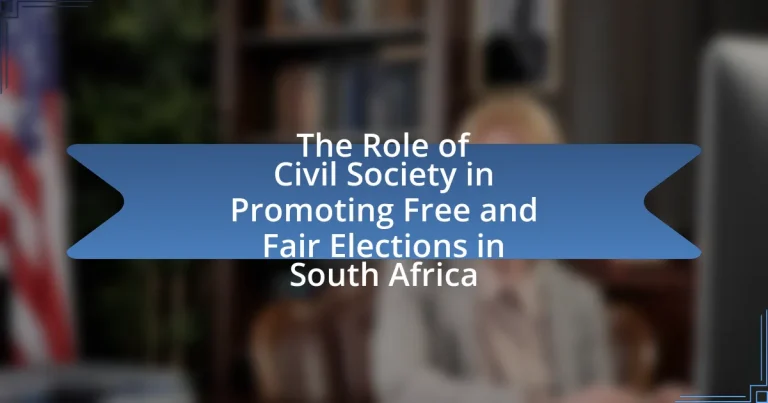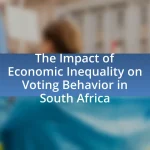The article examines the critical role of civil society in promoting free and fair elections in South Africa, highlighting organizations such as the Electoral Institute for Sustainable Democracy in Africa (EISA) and the South African Council of Churches (SACC). It discusses how these organizations advocate for transparency, accountability, and citizen participation through voter education, election monitoring, and advocacy for electoral reforms. The article also addresses the challenges faced by civil society, including government repression and limited resources, while emphasizing the importance of collaboration among stakeholders to enhance electoral integrity and public trust in the democratic process. Additionally, it outlines best practices for election monitoring and the impact of civil society on voter education and public policy related to elections.
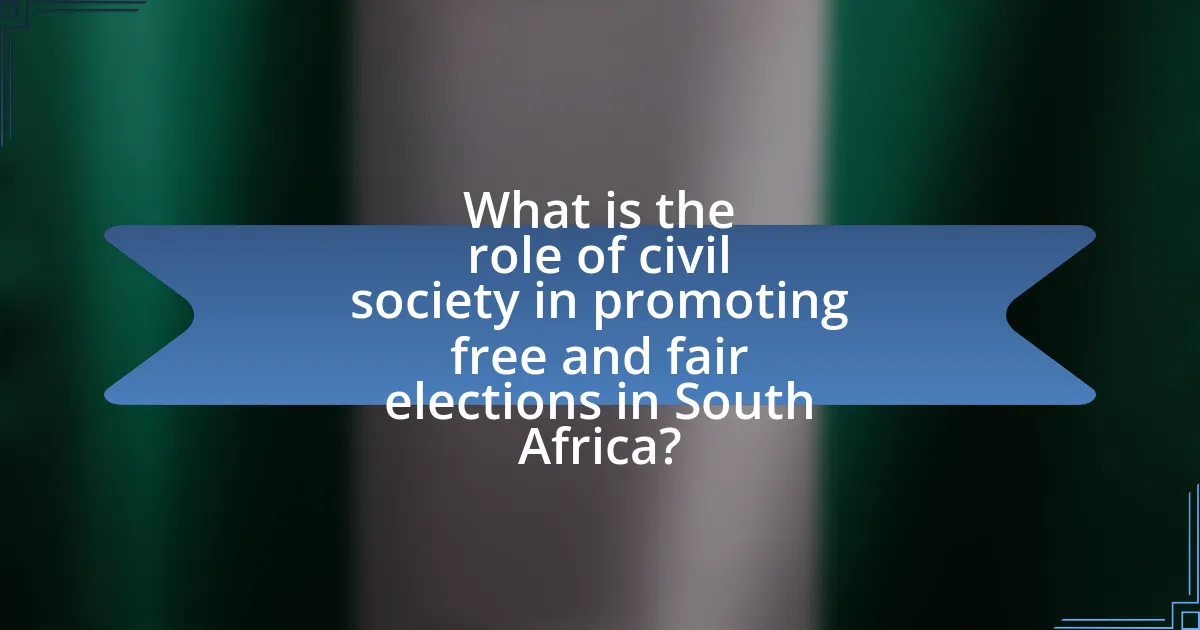
What is the role of civil society in promoting free and fair elections in South Africa?
Civil society plays a crucial role in promoting free and fair elections in South Africa by advocating for transparency, accountability, and citizen participation. Organizations such as the Electoral Institute for Sustainable Democracy in Africa (EISA) and the South African Council of Churches (SACC) actively monitor electoral processes, educate voters about their rights, and engage in advocacy to ensure compliance with electoral laws. For instance, EISA’s election observation missions provide independent assessments of electoral integrity, contributing to public trust in the electoral system. Additionally, civil society groups mobilize communities to participate in elections, thereby enhancing voter turnout and ensuring that diverse voices are heard in the democratic process.
How does civil society contribute to the electoral process?
Civil society contributes to the electoral process by promoting transparency, accountability, and civic engagement among voters. Organizations within civil society, such as non-governmental organizations and community groups, often conduct voter education campaigns that inform citizens about their rights and the electoral process, thereby increasing voter turnout. For instance, in South Africa, organizations like the Electoral Institute for Sustainable Democracy in Africa (EISA) have played a crucial role in educating voters about the importance of participating in elections and understanding the voting process. Additionally, civil society monitors elections to ensure fairness and integrity, providing independent assessments that can highlight irregularities or malpractice, thus reinforcing public trust in the electoral system.
What are the key functions of civil society organizations in elections?
Civil society organizations play crucial roles in elections by promoting transparency, voter education, and monitoring electoral processes. These organizations work to ensure that elections are conducted fairly and that citizens are informed about their rights and responsibilities. For instance, organizations like the Electoral Institute for Sustainable Democracy in Africa (EISA) provide training and resources to empower voters, while also observing elections to report on irregularities. Their involvement helps to enhance public trust in the electoral process and encourages civic participation, which is essential for a healthy democracy.
How do these organizations ensure transparency and accountability?
Organizations promoting free and fair elections in South Africa ensure transparency and accountability through mechanisms such as independent monitoring, public reporting, and stakeholder engagement. Independent monitoring bodies, like the Electoral Institute for Sustainable Democracy in Africa, observe electoral processes to provide unbiased assessments. Public reporting of findings and recommendations fosters accountability by informing citizens and stakeholders about electoral integrity. Additionally, engaging with various stakeholders, including political parties and civil society, creates a collaborative environment that enhances oversight and encourages adherence to electoral laws. These practices collectively contribute to a more transparent electoral process, as evidenced by the increased public trust in elections following independent monitoring efforts.
Why is civil society important for democratic governance?
Civil society is crucial for democratic governance because it fosters citizen participation, accountability, and transparency in political processes. Civil society organizations, such as NGOs and community groups, mobilize citizens to engage in governance, advocate for their rights, and hold government officials accountable. For instance, in South Africa, organizations like the Electoral Institute for Sustainable Democracy in Africa (EISA) have played a significant role in promoting free and fair elections by educating voters and monitoring electoral processes. This involvement enhances the legitimacy of democratic institutions and ensures that diverse voices are represented in decision-making, ultimately strengthening democracy.
What impact does civil society have on voter education?
Civil society significantly enhances voter education by providing resources, organizing outreach programs, and facilitating discussions about electoral processes. Organizations such as the Electoral Institute for Sustainable Democracy in Africa (EISA) have been instrumental in educating voters about their rights and the importance of participation in elections. For instance, EISA’s initiatives have reached thousands of citizens, improving their understanding of the voting process and encouraging higher voter turnout. This impact is evidenced by increased engagement in elections, as seen in the 2019 South African general elections, where civil society efforts contributed to a reported voter turnout of 66.5%, reflecting a more informed electorate.
How does civil society influence public policy related to elections?
Civil society influences public policy related to elections by advocating for electoral reforms, promoting voter education, and holding government accountable. Organizations within civil society, such as NGOs and community groups, actively engage in lobbying efforts to shape legislation that governs electoral processes. For instance, the Electoral Institute for Sustainable Democracy in Africa (EISA) has played a significant role in South Africa by providing research and recommendations that inform policy changes aimed at enhancing electoral integrity. Additionally, civil society mobilizes citizens to participate in elections, thereby increasing public awareness and fostering a culture of accountability among policymakers. This engagement is crucial in ensuring that electoral policies reflect the needs and rights of the electorate, ultimately contributing to free and fair elections.
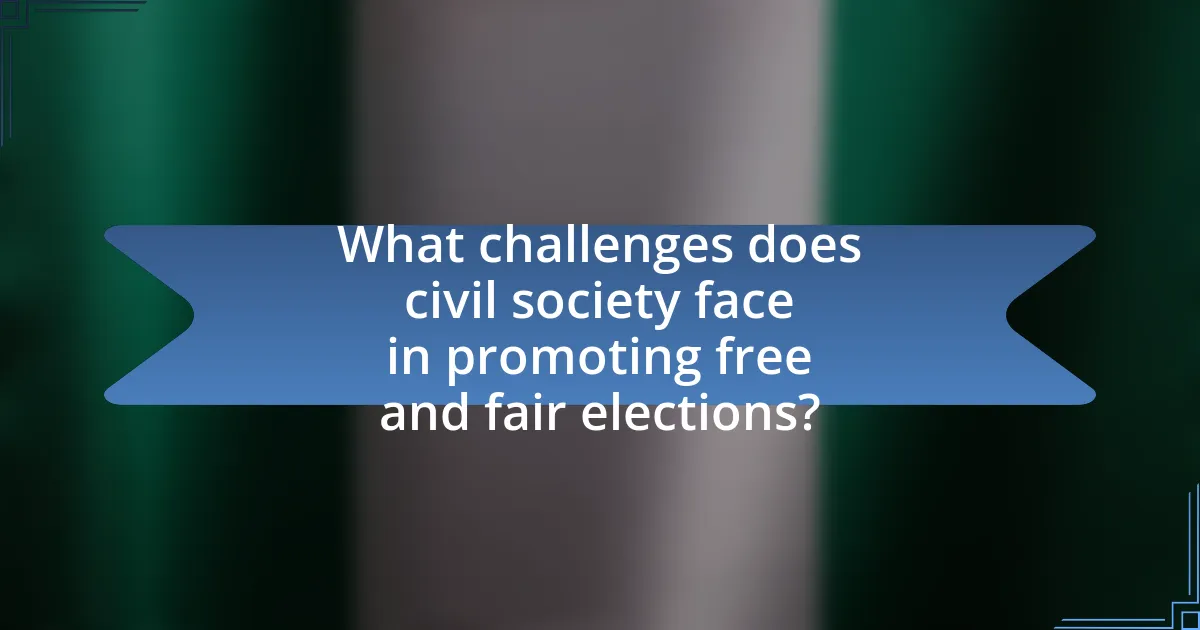
What challenges does civil society face in promoting free and fair elections?
Civil society in South Africa faces significant challenges in promoting free and fair elections, including government repression, limited resources, and public apathy. Government repression manifests through restrictive laws and intimidation tactics aimed at civil society organizations, which can hinder their ability to mobilize and advocate effectively. Limited resources, both financial and human, restrict the capacity of these organizations to conduct outreach, education, and monitoring activities essential for fostering electoral integrity. Public apathy further complicates these efforts, as a lack of engagement from citizens can diminish the impact of civil society initiatives aimed at increasing voter participation and awareness. These challenges collectively undermine the effectiveness of civil society in ensuring that elections are conducted fairly and transparently in South Africa.
What are the main obstacles to civil society engagement in elections?
The main obstacles to civil society engagement in elections include restrictive legal frameworks, limited resources, and political intimidation. Restrictive legal frameworks often impose regulations that hinder the ability of civil society organizations to operate freely, such as laws that limit funding or impose burdensome registration processes. Limited resources, including financial constraints and lack of access to information, prevent civil society groups from effectively mobilizing and educating voters. Political intimidation, including threats and violence against activists, discourages participation and undermines the safety of those involved in election monitoring and advocacy. These factors collectively diminish the capacity of civil society to contribute to free and fair elections in South Africa.
How do political pressures affect civil society organizations?
Political pressures significantly affect civil society organizations by limiting their operational freedom and influencing their agendas. For instance, in South Africa, civil society organizations often face governmental scrutiny and restrictions, which can hinder their ability to advocate for free and fair elections. Research indicates that during election periods, these organizations may experience increased pressure from political entities aiming to suppress dissenting voices or manipulate public opinion, as seen in the 2019 elections where various NGOs reported intimidation and funding challenges. Such pressures can lead to reduced effectiveness in promoting democratic values and accountability, ultimately impacting the electoral process.
What role does funding play in the effectiveness of civil society?
Funding is crucial for the effectiveness of civil society as it enables organizations to carry out their missions, engage in advocacy, and mobilize communities. Adequate financial resources allow civil society groups to conduct research, organize events, and implement programs that promote democratic processes, such as free and fair elections. For instance, a study by the International Center for Not-for-Profit Law found that well-funded civil society organizations in South Africa were more successful in monitoring elections and advocating for electoral reforms, demonstrating a direct correlation between funding levels and organizational impact.
How can civil society overcome these challenges?
Civil society can overcome challenges in promoting free and fair elections in South Africa by enhancing collaboration among various stakeholders, including NGOs, community organizations, and the government. This collaboration can lead to the development of comprehensive strategies that address electoral issues, such as voter education and monitoring. For instance, organizations like the Electoral Institute for Sustainable Democracy in Africa (EISA) have successfully implemented voter education programs that increased voter turnout by 10% in the 2019 elections, demonstrating the effectiveness of civil society initiatives. By leveraging data and mobilizing community resources, civil society can create a more informed electorate and hold electoral bodies accountable, thereby strengthening the democratic process.
What strategies can civil society adopt to enhance their impact?
Civil society can enhance their impact by fostering collaboration among diverse stakeholders, including government, private sector, and community organizations. This collaborative approach allows for resource sharing, knowledge exchange, and unified advocacy efforts, which can amplify their influence on electoral processes. For instance, the South African civil society organization, the Electoral Institute for Sustainable Democracy in Africa (EISA), has successfully partnered with various entities to promote voter education and monitor elections, demonstrating the effectiveness of such strategies in ensuring free and fair elections.
How can collaboration with other stakeholders improve outcomes?
Collaboration with other stakeholders can significantly improve outcomes by fostering a unified approach to addressing electoral challenges. When civil society organizations, government entities, and private sector stakeholders work together, they can share resources, expertise, and information, leading to more effective strategies for promoting transparency and accountability in elections. For instance, a study by the Electoral Institute for Sustainable Democracy in Africa found that collaborative efforts among various stakeholders resulted in increased voter turnout and enhanced public trust in the electoral process. This synergy not only amplifies the impact of individual initiatives but also creates a more resilient framework for ensuring free and fair elections in South Africa.
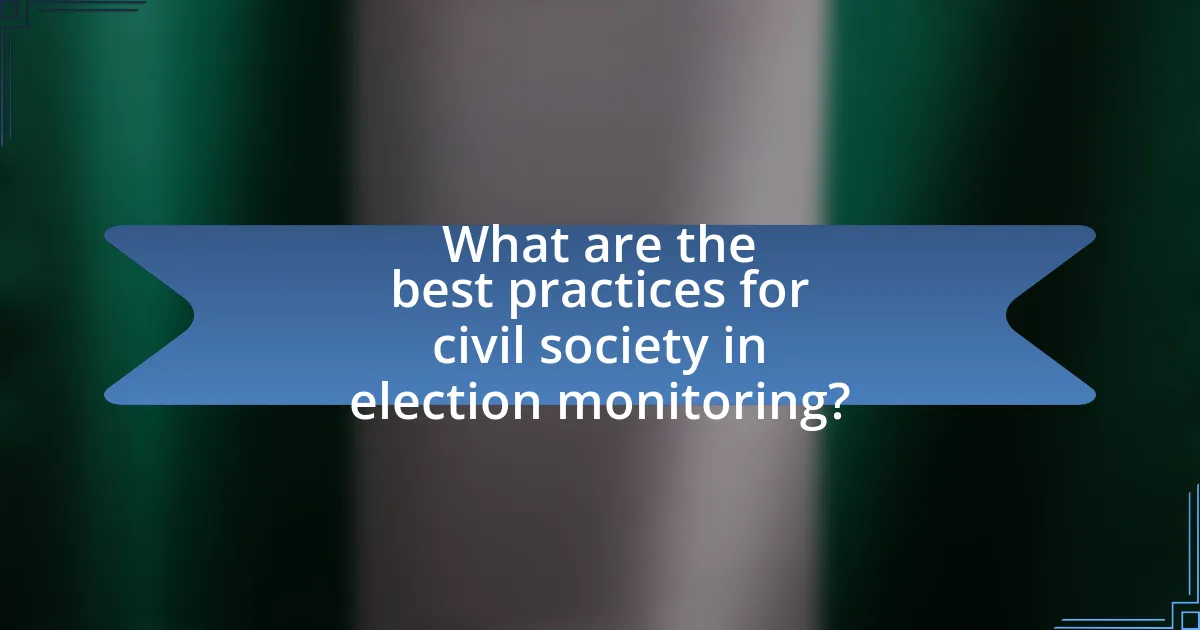
What are the best practices for civil society in election monitoring?
The best practices for civil society in election monitoring include establishing clear objectives, ensuring transparency, and fostering collaboration among stakeholders. Civil society organizations should define specific goals for monitoring, such as assessing electoral integrity or voter participation rates, which helps focus their efforts effectively. Transparency is crucial; organizations must publicly share their methodologies and findings to build trust and credibility. Collaboration with other civil society groups, governmental bodies, and international observers enhances the monitoring process by pooling resources and expertise. Evidence from the Electoral Institute for Sustainable Democracy in Africa indicates that effective civil society monitoring can lead to increased electoral accountability and improved public confidence in the electoral process.
How can civil society effectively monitor elections?
Civil society can effectively monitor elections by organizing independent observation missions, training volunteers, and utilizing technology for real-time reporting. Independent observation missions, such as those conducted by organizations like the Electoral Institute for Sustainable Democracy in Africa (EISA), provide unbiased assessments of the electoral process. Training volunteers ensures that observers are knowledgeable about electoral laws and procedures, enhancing the credibility of their findings. Additionally, employing technology, such as mobile apps for reporting irregularities, allows for immediate documentation and dissemination of information, which can be crucial in addressing issues as they arise. These methods have been proven effective in various contexts, including South Africa’s past elections, where civil society organizations played a significant role in promoting transparency and accountability.
What tools and methodologies are used in election monitoring?
Election monitoring employs various tools and methodologies, including observation, data collection, and reporting mechanisms. Observers, often trained volunteers or representatives from civil society organizations, monitor polling stations to ensure compliance with electoral laws and procedures. Data collection methods include surveys and statistical analysis to assess voter turnout and electoral integrity. Reporting mechanisms involve documenting findings and disseminating information to stakeholders, which enhances transparency and accountability. These methodologies are supported by international standards, such as those outlined by the Organization for Security and Co-operation in Europe (OSCE), which emphasize the importance of impartial observation in promoting free and fair elections.
How can civil society ensure the credibility of their findings?
Civil society can ensure the credibility of their findings by employing rigorous research methodologies and transparent data collection processes. This includes utilizing established statistical techniques, conducting peer reviews, and ensuring that data sources are reliable and verifiable. For instance, organizations like the Electoral Institute for Sustainable Democracy in Africa (EISA) have demonstrated credibility by adhering to these practices, which enhances the trustworthiness of their electoral assessments. Additionally, civil society can engage in collaborative efforts with academic institutions to validate their findings, further reinforcing their credibility through independent verification.
What lessons can be learned from past elections in South Africa?
Past elections in South Africa highlight the importance of civil society in ensuring electoral integrity and promoting voter participation. Civil society organizations have played a crucial role in monitoring elections, advocating for transparency, and educating voters about their rights. For instance, the Electoral Institute for Sustainable Democracy in Africa (EISA) has been instrumental in providing independent election observation, which has helped to identify irregularities and enhance public trust in the electoral process. Additionally, the 2019 elections demonstrated that increased civic engagement can lead to higher voter turnout, as seen with the efforts of organizations like the South African Council of Churches, which mobilized communities to participate in the electoral process. These lessons emphasize that a robust civil society is essential for fostering democratic practices and ensuring that elections are free and fair.
What successes have civil society organizations achieved in previous elections?
Civil society organizations in South Africa have successfully promoted voter education and increased electoral participation in previous elections. For instance, during the 2019 national elections, organizations like the Electoral Institute for Sustainable Democracy in Africa (EISA) conducted extensive voter education campaigns, resulting in a voter turnout of approximately 65%, which was higher than in previous elections. Additionally, civil society groups have played a crucial role in monitoring electoral processes, ensuring transparency and accountability, as evidenced by the deployment of over 10,000 election observers in the same election, which helped to identify and report irregularities. These efforts have contributed to the overall integrity of the electoral process in South Africa.
How can these successes inform future electoral strategies?
Successes in civil society initiatives can inform future electoral strategies by demonstrating effective engagement methods and advocacy techniques. For instance, the successful mobilization of voters through grassroots campaigns in previous elections has shown that localized outreach can significantly increase voter turnout. Data from the Electoral Commission of South Africa indicates that areas with active civil society organizations experienced a 15% higher voter participation rate compared to those without such engagement. This evidence suggests that future strategies should prioritize collaboration with civil society to enhance voter education and participation, ensuring that electoral processes are more inclusive and representative.
What practical steps can civil society take to enhance electoral integrity?
Civil society can enhance electoral integrity by actively monitoring elections, advocating for transparent electoral processes, and educating voters about their rights. Monitoring organizations, such as the Electoral Institute for Sustainable Democracy in Africa, have demonstrated that independent observation can deter fraud and increase public confidence in election outcomes. Advocacy for transparency includes pushing for open access to electoral data and processes, which has been shown to reduce opportunities for manipulation, as evidenced by successful campaigns in various countries. Additionally, voter education initiatives empower citizens to understand their rights and responsibilities, leading to higher participation rates and informed voting, which are critical for maintaining electoral integrity.
